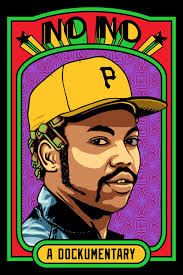What's Up, Docs
Thanks to a last-minute decision to show up at a trivia contest, my husband and I won a total of 20 tickets to movies at the Key West Film Festival. This is the festival's third year and we've never made it before to any of the events. This year we had no excuse.
I saw eight movies in four days, half of them documentaries and, as usual, the documentaries impressed me the most. Maybe it's a nonfiction writer's prejudice but I know how hard it is to turn factual information and real people into a compelling story. In these cases, they pulled it off. If any of these films make it to an art house cinema or an online platform near you, they are worth catching.
My favorite was probably No No: A Dockumentary about Dock Ellis, the Pittsburgh Pirates pitcher from the 1970s who threw a no-hitter ... while tripping on acid. Apparently there's some doubt about that, though from Ellis' story it seems pretty clear that he was tripping his brains out the day before. The film is actually an in-depth, sympathetic but not hagiographic portrait of Ellis, who died in 2008. He made it to the major leagues in the late 1960s and was part of the post-Jackie Robinson generation that helped bring a new generation's attitudes to the baseball field -- and helped the Pirates win the World Series. There was lots of great baseball history and some interesting cultural history, too. And plenty of plain talk about the drugs; just about all the players took them (mostly "greenies," or speed) that should help provide some context for those who like to be all shocked, shocked about more recent doping in baseball ... or cycling or any other sport you'd care to examine closely.
Another good one was Point and Shoot, a profile of Matt VanDyke, a would-be adventure filmmaker who decides to embark on a "crash course in manhood" by riding a motorcycle and shooting digital film around the Middle East like a modern Lawrence of Arabia. He eventually winds up hanging out with U.S. soldiers in Afghanistan and then, even more dangerously, joins up with Libyan rebels during the Arab spring. Reviews of this movie in Entertainment Weekly and the New York Times* were positive about the movie but very contemptuous of VanDyke, comparing him to Timothy Treadwell, subject of Werner Herzog's great documentary Grizzly Man. My husband and I had the same reaction -- we didn't find VanDyke anything like the egomaniacal delusional Treadwell. In fairness, we were about 10 minutes late to the movie so we missed the opening part about him being a selfish, spoiled son and boyfriend. But his account of himself as a filmmaker, which the reviewers seemed to hate, seemed fairly straight-up. And I could not help but admire a guy who, despite having absolutely no preparation and a pretty severe case of OCD, just plunges into a world about which he knows nothing ... and grows to love it so much that he risks his life. He struck me as naive but sincere, and not as self-aggrandizing as plenty of people I've met in real life who have done things much less impressive.
The last full-length documentary I saw was The Life and Mind of Mark DeFriest, which I noticed because of this Miami Herald story by Cammy Clark. Here's a fairly positive review from Variety, too. It's a perfect documentary subject and exceedingly well told, with interviews with DeFriest, vintage films of the facilities where he was held and animations illustrating parts of his story in engaging yet haunting ways. Most chilling, to me, was the footage of the shrink whose testimony helped DeFriest get a life sentence after escaping from a mental hospital. DeFriest's original prison sentence was four years, for charges that stemmed from his "theft" of tools he believed his father had left him. The estate had not yet been probated, and DeFriest's stepmother called the cops. He was 19. He was also a MacGyver-like mechanical genius who could pick locks, fashion keys and weapons and destroy jail cells -- all of which he did, repeatedly, both in escape attempts and out of pure defiance. Whether he is mentally ill or not, it is a tragic waste of an intelligent life to keep a nonviolent offender locked up -- mostly in solitary -- for decades. The filmmakers are on a campaign to help win him probation. That's where the shrink comes in -- he's decided he was wrong all those years ago and is now testifying on DeFriest's behalf. But the shrink looks decidedly shifty, with bitten-to-the-quick fingernails, shaking hands and badly-dyed hair. It's just unsettling, and more than unsettling when you realize the impact this man has had on DeFriest's life .. and probably many more. And that DeFriest's fate is now dependent on him more than ever. This film makes you proud to be a Floridian. Not.
So thanks for the tickets, Film Festival! I saw a bunch of really interesting movies (the dramas were good, too: The Salvation, Alex of Venice, The Zero Theorem and The Imitation Game). I'll be back next year, paying for my seats this time.
* The New York Times review of Point and Shoot is worth checking out if only for its epic correction. As my husband said, "Did that guy even see the movie?"
